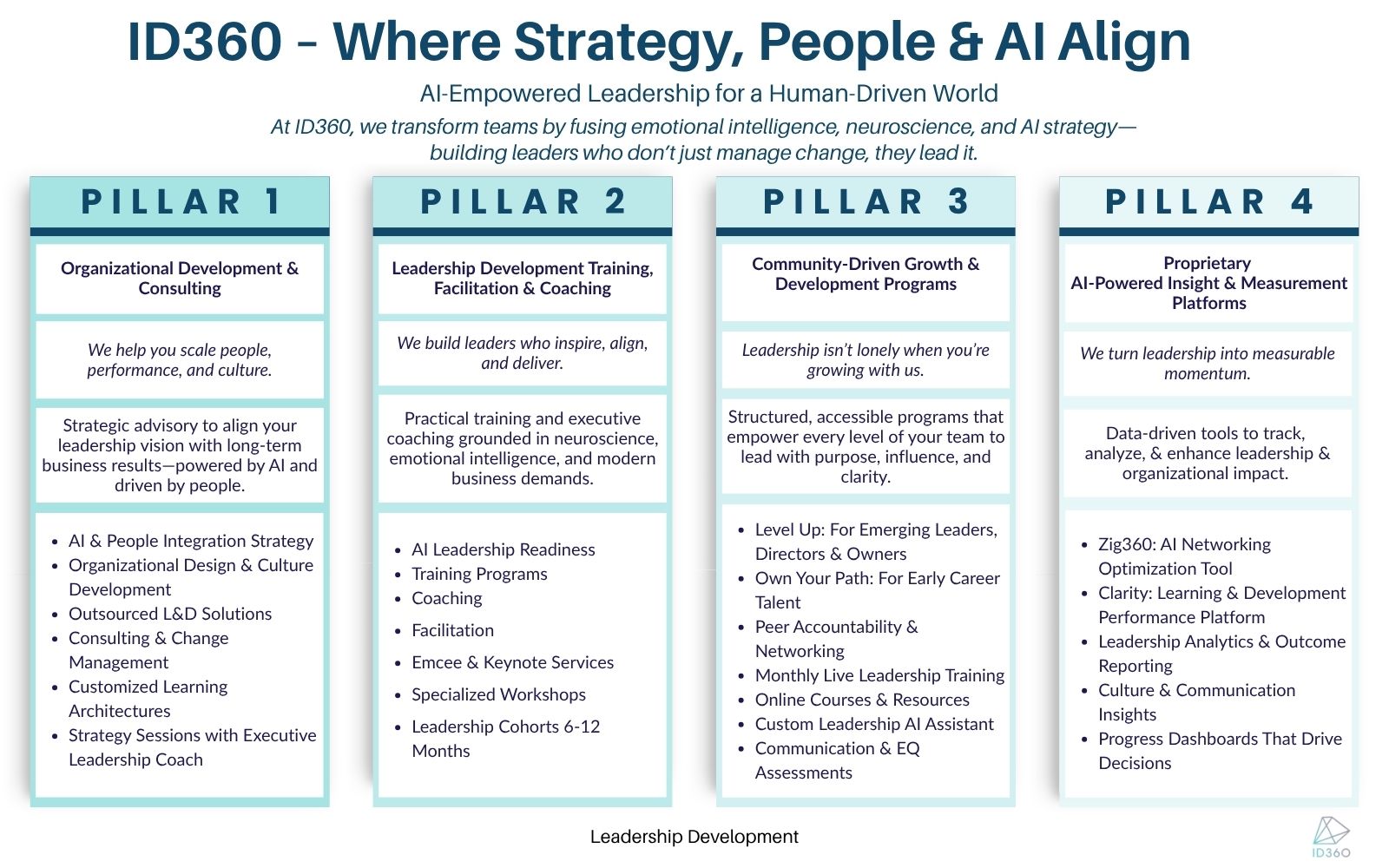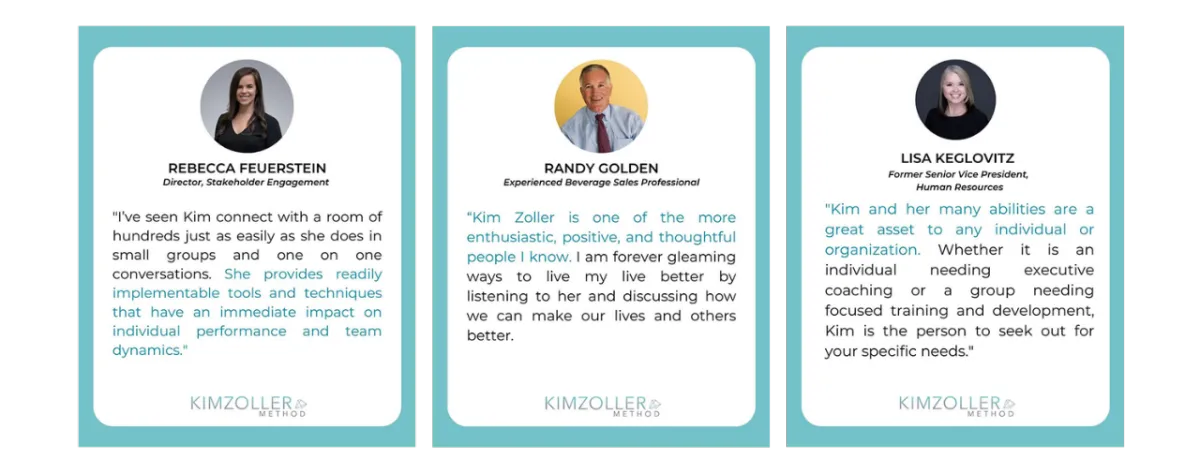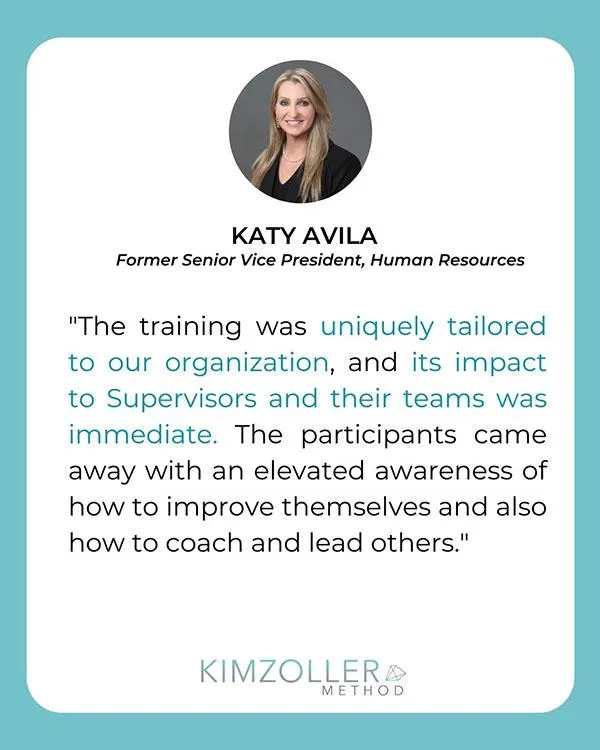Leadership Training & Development
Transform your team with leadership development solutions designed to empower all levels of your organization for unprecedented results.
Leadership Training & Development
Transform your team with leadership development solutions designed to empower all levels of your organization for unprecedented results.
LEADERSHIP REDEFINED
WE HELP YOU BUILD THE HEARTSET, MINDSET & SKILLSET FOR CHANGE.

Leadership Development

Operating Cadence

Executive Coaching

Leadership Training

Management Training

Executive Coaching
We equip your leaders to think, operate, and lead at the speed of change.
Today’s organizations don’t suffer from a lack of intelligence—they suffer from leadership gaps. High performers get promoted without preparation. Strategies stall. Culture doesn’t scale. And now, AI is reshaping work faster than most leaders are ready for.
At ID360, we close these gaps.
We help organizations embed the heartset, mindset, and skillset needed to lead through disruption—so people thrive, culture sticks, and systems scale. We build leaders who don’t just manage people, but move them—who can harness human and AI potential to drive outcomes.
If your goals are stalling, the gap isn’t in your ambition. It’s in your execution. Let’s fix that.

The Cost You’re Paying By Having People Problems, Retention Problems & Poor Leadership Can All Be Solved With Our Proven Plan
Without a strategic plan for growth, you are trapped…
Chasing time that was lost on the wrong idea, the wrong employee or the wrong strategy that failed to deliver the results you were looking for.
Guessing at what can create synergy between your team and your stakeholders.
Questioning your team: can they get the job done, will they “grow” into the people you hope they will become, or is it time to let someone go?
Jugging your staff, resources, and energy because you are missing the critical steps in your plan.
Wondering why your team has failed to reach their potential: is the staff, your corporate culture, your leadership or something else?
Feeling frustrated, uncertain and confused about what your best next steps should be.
If this is your reality, it’s time to change your approach.
Clients Success & Their Stories
ID360 & The Kim Zoller Method™
Led by Kim Zoller and her incredible team of strategic partners, executive coaches, leadership development trainers and facilitators, at ID360 we know how to reach your organization in ways that empower and inspire everyone so collectively they reach their goals. Leadership training has gone through an evolution in the past 5 years. With the invention of AI and other critical “time saving” skills, your team may be in dire need of upskilling and inclusion.
As a corporate trainer for more than 30 years, Kim and her partners know that different brains and learning styles require different approaches to management, leadership and team building. The Kim Zoller Method is a proven, repeatable, and measurable way of working with your team that is designed to empower your entire team to reach their goals.

ID360 Services
Pillar 1
Organizational Development & Consulting
We build high-performing organizations by transforming leadership, culture, & strategy for lasting success.
Strategic, ongoing support for company-wide L&D, culture-building, & continuous growth.
Organizational Development
Consulting Services
L&D Strategy
Outsourced L&D Solutions
Change Management
AI & Human Integration In Organizational Development
Pillar 2
Leadership Development Training, Facilitation & Coaching
We equip leaders with the skills, confidence, & mindset to inspire teams and drive measurable results.
Building core leadership skills
Training Programs
Facilitation
Emcee & Keynote Services
Specialized Workshops
Executive Coaching
Leadership Cohorts 6-12 Months
AI Leadership Readiness
Pillar 3
Level Up: Membership Subscription
A community-driven leadership program that accelerates growth, builds influence, & creates future-ready leaders.
An open-enrollment, accessible, & structured leadership development program
Accountability & Community
1:1 Strategy Session with an Executive Coach
Topic-Based Monthly Challenges
Online Leadership Courses
Monthly Leadership Training
Pillar 4
Proprietary Performance Measurement Tools
We turn leadership development into measurable success with data-driven insights & real-time impact tracking.
Data-driven tools to track, analyze, & enhance leadership & organizational impact.
Clarity: Performance insight platform for tracking L&D impact
Zig360: Strategic relationship-building & influence mapping tool
Outcome Reporting & Analytics
ID360's Proven Leadership Development Programs
At ID360, we specialize in transforming leaders at all levels by empowering them with the skills, tools, and mindset to drive unprecedented business results. Our expertly crafted leadership cohort programs catalyze growth, improve retention, boost productivity, and directly impact your bottom line.
We drive personal and professional improvement for individuals, teams, and organizations by building customized, results-oriented solutions. As your partner, we’ll help create the clarity you need to drive your business and employees to achieve accelerated growth on all levels.

FREE Ebook
Leadership Mastery: 5 High-Impact Strategies to Drive Results & Legacy
Meet Kim Zoller
Kim Zoller, CEO and founder of ID360 has worked with corporations, individual leaders, teams and their staff for more than thirty years. Along the way, she has personally impacted the lives of more than 200K clients making a measurable and meaningful impact on their bottom line. Kim’s belief that “change comes from the inside out” is a core value of the ID360 brand and one you will see embodied across our entire team.
Kim’s strength lies in her ability to be a true strategic partner to her clients. As a dynamic facilitator and coach, she brings this same value to everything she does and every life she touches. The executive coaching team at ID360 embodies these same values, which is how we are able to make such a powerful impact across all of the clients we serve with our leadership development and training programs.
As Someone Who Wants To Become A Strong And Impactful Leader, There Are Real Barriers That Get In The Way Of Reaching Your Goals.
Leaders are trained, not magically created. Leadership skills are tangible, repeatable and not personal. That means that leadership skills are not imbued on one person over another. If you want to become a stronger leader, your job is to engage in the training necessary to reach your goals.
In today’s hyper-busy world, so many “managers” or “leaders” are promoted from within and don’t receive the essential people skills and training they need. Consequently, conflicts and breakdowns in communication cause frustration within the organization and cause important team members to leave.
This is preventable.
We understand that people are promoted to leadership roles often based on their achievements in one area and then asked to manage a team when they haven't been taught leadership skills. This deficit in training is something we can resolve for you. It’s also why we have spent the past 30+ years elevating companies by transforming their leaders.
Here’s how we do it:

Define your desired goals and outcome.

Create a customized training for you and your team that is tailored to your current challenges and desired results.

Implement and equip you with the leadership training and skills necessary to thrive.
When you partner with ID360, you bring the Kim Zoller Method, our executive experience and our team into your world which includes the customized leadership training needed to reach your goals.
To explore working with ID360, please schedule a complimentary call with our team today.

Our Advisory Council & Clients
Are you ready to stop the insanity going on at your organization and find a healthier way to thrive? Reach out to the team at ID360 today for a complimentary consultation to see how we can accelerate your leadership training and development in the upcoming year.

Copyright © 2023 • ID360, Inc. • All Rights Reserved
Privacy Policy | Terms of Service









































